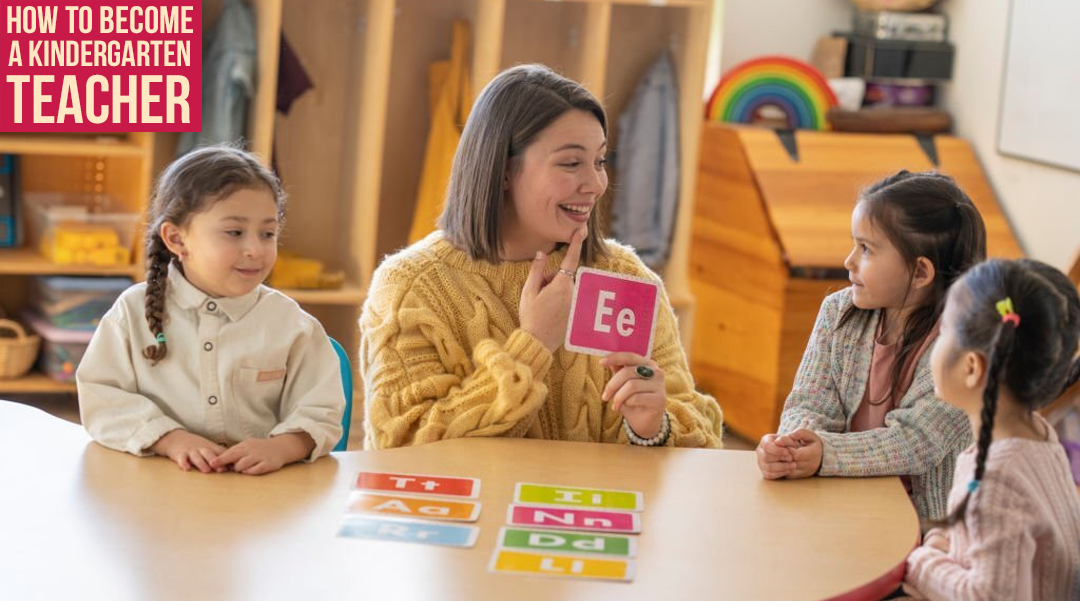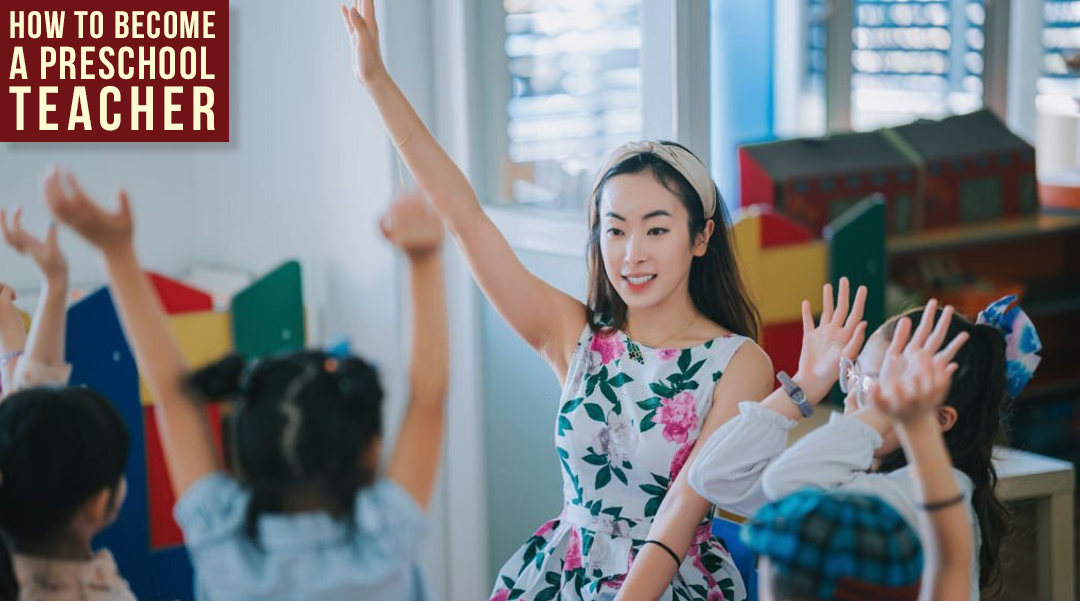Your Cart is Empty
- Ornament 🔥
- Gift for Family 🏠❤️
-
Pet
-
Memorial
-
Products
-
Home & Garden
-
Accessories
- Happy Customers ❤️
How to Become a Kindergarten Teacher: Nurturing Young Minds
September 08, 2023 7 min read

Are you passionate about shaping the future and making a lasting impact on young lives? If so, becoming a kindergarten teacher might just be the path for you! In this guide, we'll walk you through the steps to become a kindergarten teacher, from the initial spark of interest to standing confidently in front of a class full of eager youngsters.
So, what's the deal with becoming a kindergarten teacher? How can you navigate the intricate world of early childhood education? Stick with us as we unveil the secrets of embarking on this rewarding journey. Let's dive right in!
Contents
1. Lay the Foundation

To become a kindergarten teacher, you need to start with a strong educational foundation. Here's how to get started:
- Earn a Bachelor's Degree
Begin by obtaining a bachelor's degree in education, preferably with a focus on early childhood education or a related field. This will equip you with the necessary knowledge and skills. While pursuing your degree, you'll delve into subjects like child development, educational psychology, and classroom management. These courses will provide you with a solid understanding of the unique needs and challenges of young learners.
- Certification is Key
After completing your degree, you'll need to earn a teaching certification. The exact requirements may vary by state or country, so be sure to research the specific regulations in your area. Certification typically involves passing exams and demonstrating your proficiency in teaching methods, curriculum planning, and classroom assessment. It's the official stamp of approval that allows you to teach in public schools and ensures you're well-prepared for the role.
- Internships and Student Teaching
In addition to coursework, gaining practical experience is crucial. Seek out internships and student teaching opportunities to put your knowledge into action. These hands-on experiences will give you a taste of what it's like to manage a classroom full of kindergarteners. You'll have the chance to observe seasoned educators, learn effective teaching techniques, and develop your classroom management skills. It's in these moments that theory transforms into practice, preparing you for the real-world challenges of teaching.
By earning your degree, obtaining certification, and gaining practical experience, you'll lay a strong foundation for a successful career as a kindergarten teacher. Education is your stepping stone to making a positive impact on the lives of young learners and helping them embark on their educational journey.
2. Develop Your Teaching Skills

Working with kindergarteners requires an abundance of patience. Here's how to hone this essential skill:
-
Practice Patience
Patience isn't just a virtue; it's a necessity in kindergarten classrooms. Practice staying calm in stressful situations and handling the constant energy of young children. Embrace the fact that kindergarteners may have short attention spans, varying abilities, and emotional ups and downs. Your patience will serve as a calming influence and create a positive learning atmosphere. -
Effective Communication
Developing strong communication skills is paramount when teaching kindergarteners. You'll need to explain concepts in simple terms and actively listen to your students. Pay attention to non-verbal cues, as young children often express themselves through body language and facial expressions. By fostering open and clear communication, you'll establish trust and create an environment where children feel comfortable expressing themselves and asking questions. -
Adaptability
Be flexible and adaptable in your teaching approach. Kindergarteners can be unpredictable, so being able to change course on the fly is crucial. Be prepared to modify your lesson plans based on the needs and interests of your students. Embrace spontaneity and be ready to explore teachable moments as they arise. Flexibility will not only keep your lessons engaging but also allow you to meet the individual needs of each child in your classroom. -
Empathy and Compassion
Empathy and compassion are the bedrock of effective teaching. Kindergarteners may come to school with a range of experiences and emotions. Understanding and acknowledging their feelings is vital for building strong teacher-student relationships. Show empathy by validating their concerns, offering support, and creating a safe and nurturing environment. Compassionately guide them through challenges and celebrate their achievements, no matter how small they may seem. Your empathy and compassion will leave a lasting impression on young hearts and minds, fostering a love for learning.
By practicing patience, honing your communication skills, embracing adaptability, and cultivating empathy and compassion, you'll develop the essential teaching skills needed to connect with and inspire kindergarteners. Remember that every child is unique, and your ability to adapt to their individual needs will make you a truly exceptional kindergarten teacher.
3. Gain Practical Experience

Now that you've got your education and skills in check, it's time to gain practical experience. Here's how to do it:
-
Substitute Teaching
Start by working as a substitute teacher. This invaluable experience will give you a taste of the classroom environment and allow you to build connections in the education community. As a substitute, you'll step into various classrooms, encountering different teaching styles and student dynamics. This diversity will broaden your perspective and help you adapt to various teaching situations. It's a fantastic opportunity to practice your classroom management skills, refine your teaching techniques, and learn how to handle unexpected challenges. -
Teacher's Aide
Consider becoming a teacher's aide to assist experienced educators. This role allows you to work closely with seasoned teachers, providing you with hands-on learning opportunities. You'll learn the ropes while providing valuable support in managing the classroom, preparing materials, and working with students. Teacher's aides often form strong mentorship relationships with teachers, gaining insights and guidance that are invaluable as you progress in your teaching career. -
Internships and Volunteer Opportunities
Seek out internships or volunteer opportunities in kindergarten classrooms. Hands-on experience is the best teacher, and there's no substitute for being in the thick of it. During internships, you'll have the chance to actively participate in the teaching process, working with small groups of students and contributing to lesson planning. Volunteering in classrooms can also provide valuable exposure to the daily routines and challenges of teaching kindergarten. Plus, it's an excellent way to give back to your community and make a positive impact on young learners. -
Professional Development
In addition to direct classroom experience, invest in ongoing professional development. Attend workshops, conferences, and seminars focused on early childhood education. These opportunities will keep you updated on the latest teaching strategies, curriculum trends, and educational technologies. Networking with fellow educators can lead to collaborations and insights that enhance your teaching skills. Continuous learning and growth are essential to becoming a well-rounded and effective kindergarten teacher.
By immersing yourself in substitute teaching, embracing the role of a teacher's aide, seeking internships and volunteer opportunities, and prioritizing professional development, you'll gain the practical experience needed to excel as a kindergarten teacher. Remember that every day in the classroom is a chance to learn and grow, ultimately benefiting the young minds you'll inspire in the future.
4. Land Your Dream Job

You've put in the hard work, and now it's time to land that kindergarten teaching job. Here's how to make it happen:
-
Polish Your Resume
Craft a stellar resume that highlights your education, certifications, and relevant experience. Don't forget to include any specialized training or coursework related to early childhood education. -
Network
Leverage your connections in the education field. Attend job fairs, join professional organizations, and reach out to former professors or colleagues for job leads. -
Ace the Interview
Prepare for interviews by researching common kindergarten teaching questions and practicing your responses. Highlight your passion for working with young children and your ability to create a nurturing learning environment. -
Stay Current
Continue your professional development by attending workshops, conferences, and staying up-to-date with the latest trends in early childhood education.
Becoming a Kindergarten Teacher: A Rewarding Journey
Becoming a kindergarten teacher is not just a job; it's a calling. You'll have the opportunity to shape the minds of the future generation, nurture their curiosity, and lay the foundation for a lifetime of learning. It's a path that requires dedication, but the rewards are immeasurable.
So, how do you become a kindergarten teacher? It starts with education, patience, practical experience, and a strong desire to make a positive impact. Follow the steps outlined in this guide, and you'll be well on your way to becoming the inspiring teacher every young child deserves.
Remember, the journey to becoming a kindergarten teacher may have its twists and turns, but it's all part of the adventure. Embrace the challenges, cherish the milestones, and prepare to embark on a fulfilling career that will leave a lasting mark on the hearts and minds of your students.
5. Conclusion: Embrace the Journey to Kindergarten Teaching

As we reach the conclusion of this guide, it's evident that the path to becoming a kindergarten teacher is filled with purpose, passion, and profound learning. Each step in your journey, from laying the educational foundation to gaining practical experience, is a building block that shapes you into a nurturing and inspiring educator.
Remember, becoming a kindergarten teacher is not just about imparting knowledge; it's about fostering a love for learning, nurturing curiosity, and providing a safe haven for young minds to flourish. It's a rewarding journey that comes with challenges, but it's these very challenges that will test your dedication and resilience, ultimately making you a stronger and more empathetic teacher.
So, how do you become a kindergarten teacher? It starts with education, patience, practical experience, and an unwavering commitment to making a positive impact on the lives of young learners. Embrace the joys and surprises that each day in the classroom brings. Cherish the moments when you see a child's eyes light up with understanding, and take pride in knowing that you are helping to shape the future.
Related articles in Teacher

Unlocking Success: How to Ask a Teacher for a Letter of Recommendation
September 08, 2023 7 min read
Explore the ultimate guide to becoming an elementary school teacher, from qualifications to practical tips, and embark on a journey to shape young minds.
Read More
Mastering the Path: How to Become an Elementary School Teacher
September 08, 2023 6 min read
Explore the ultimate guide to becoming an elementary school teacher, from qualifications to practical tips, and embark on a journey to shape young minds.
Read More
 Track Order
Track Order